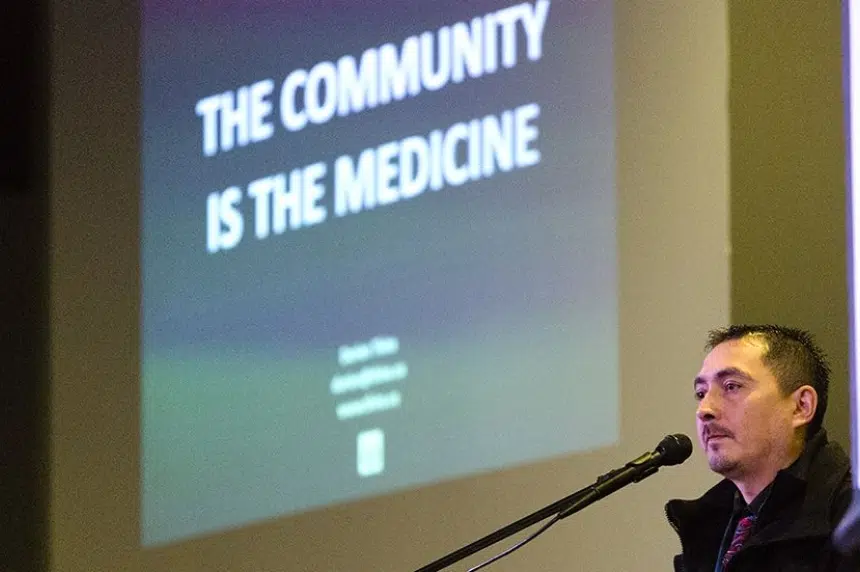People from across Saskatchewan have gathered in Prince Albert to address the troubling youth crisis in the North.
Sturgeon Lake drum group Ironswing welcomed them with a welcome song, honour song and a victory song.
The gathering, titled ‘The Community is the Medicine’ aims to equip indigenous peoples with the right information to address suicide in their communities.
Frontline workers, including teachers and mental health workers will sit side by side with students and youth from First Nation communities as they hear keynote speakers address the issue.
Grand Chief Ron Michel of the Prince Albert Grand Council (PAGC) said some of the issues First Nations are dealing with can be related back to a colonial mentality.
“One of the things I’ve been relaying to governments is ‘you have to give us the right to govern ourselves, the right to take care of ourselves,” Michel said. “We’re peoples that took care of ourselves for many, many centuries… you’ve tried for so many years to colonize us.’ They’ve tried to take our language and culture and we’re still around.”
Drugs and alcohol were addressed in the opening remarks from PAGC vice chiefs Chris Jobb and Joseph Tsannie.
Michel said these two topics do play a role into some of the issues indigenous people face when it comes to suicide.
“We in leadership have tackled with that in terms of what’s happening with bootlegging,” Michel said. “We’ve sat with justice, we’ve sat with the transportation companies in the further North. It’s something that leadership has taken. But again, it’s gotta be the community.”
“For me, the way [my work and the conference] combine is it all relates to mental health,” said Clifford Ballantyne, Access Open Minds member. “It’s important that we empower the youth, but also give them the tools they need in order to seek help when they’re dealing with the trauma, a lot of the pain from all the struggles we go through.”
Access Open Minds is a five-year initiative which takes a look at the mental health aspect of indigenous communities.
The main objective is to transform the way youth use and access mental health services in Canada.
Ballantyne said it’s important to talk about feelings and what goes on inside communities as well as acknowledging indigenous identity.
“We have to take back that identity and own it for our own,” Ballantyne said. “Because a lot of people in our communities don’t want to feel these things, that’s why they come up with these coping mechanisms.”
For Ballantyne, it’s about mental well-being. For the work he does, he said the most critical part is engaging with youth. Over the summer, groups representing Access Open Minds visited communities to engage directly with teens.
“Someone once told me [engaging youth is] a lot of hard work and it’s heart work,” Ballantyne said. “You have to give a little more than you’re almost comfortable to in order to properly start engaging youth.”
Despite a lower youth representation than he would have liked to see, he said he feels the workers present play an important role in their own community.
“It’s very unfortunate that it seems like there’s more workers than there are young adults,” Ballantyne said. “A lot of these communities, they talk about putting the youth priority next to the elders, but I feel, personally, that’s not the case right now.”
Ballantyne said he originally intended to make the gathering appeal to people who are struggling with mental health issues in indigenous communities, not just the frontline workers.
The gathering will take place over the next two days at Plaza 88 in Prince Albert. Dr. Darien Thira, a psychologist who has worked with various First Nation communities across the country will be addressing the group.
He has been a part of a number of initiatives worldwide which address suicide in indigenous communities.
– with files from Bryan Eneas with paNOW











